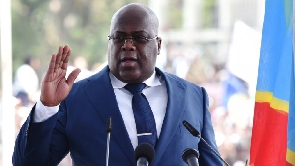 Felix Tshisekedi, President of the DR Congo
Felix Tshisekedi, President of the DR Congo
Sylvestre Ilunga Ilunkamba, the prime minister of the Democratic Republic of Congo (DR Congo) was ousted in a parliamentary vote of no confidence on Wednesday. It's the latest chapter in a growing rift between the country's current president, Felix Tshisekedi, and allies of his predecessor, Joseph Kabila.
The National Assembly of DR Congo approved a motion of censure against Ilunkamba with a thumping 367-7 majority, albeit with more than 100 abstentions. The prime minister now has 24 hours to step down from the role.
While Ilunkamba denounced the censure motion, Francois Nzekuye, an MP, told news agency AFP that he wouldn't resign.
The prime minister called the motion of censure "a political manoeuvre with no basis in fact, flouting the requirements of the state of law."
Ilunkamba and other pro-Kabila supporters boycotted the vote in the Kinshasa parliament, arguing that an interim speaker of parliament didn't have constitutional authority to pass a no-confidence motion.
Political clash
Tshisekedi has been president of the mineral-rich DR Congo since he won the 2018 election. He succeeded Kabila in the country's first peaceful transition of power since gaining independence from Belgium in 1960.
Despite winning the presidential vote, he is reliant on blocs aligned with Kabila in parliament.
Tshisekedi's supporters say the coalition government between his parliamentary alliance, Heading for Change (CACH), and the Common Front for Congo (FCC), which is composed of parties and politicians loyal to ex-President Joseph Kabila, had straitjacketed his leadership. He appointed Ilunga as prime minister some six months after his election following protracted talks on a Cabinet with the FCC.
Tshisekedi announced in December 2020 that he was putting an end to the coalition and forming a new political alliance, the "Sacred Union."
Since then, Tshisekedi has been cracking down on pro-Kabila supporters in an attempt to strengthen his power. On Wednesday, Pastor Daniel Ngoy Mulunda, an ally of Kabila, was sentenced to three years in jail for "endangering state security, inciting tribal hatred and spreading false rumours."